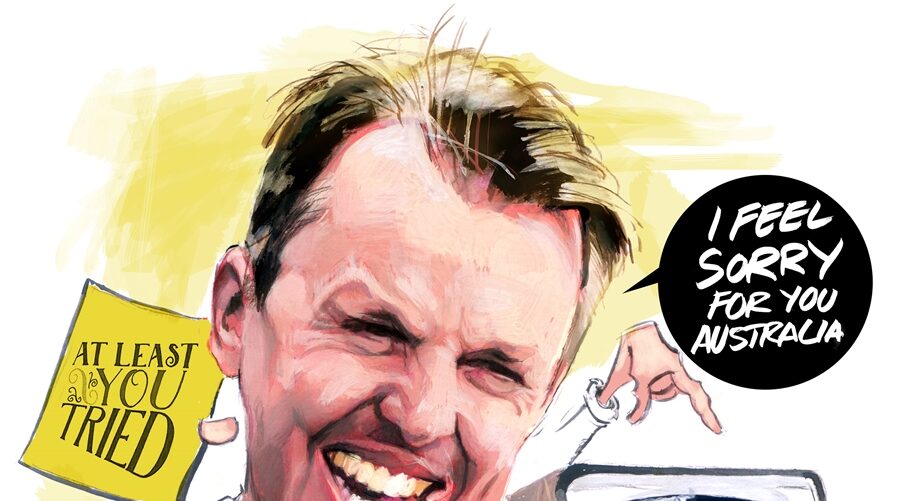By Tristan Lavalette
Fortunately for a beleaguered Australia, their disastrous limited-overs tour of the UK was firmly an afterthought back home. Cricket annually is relegated into the backdrop during the Australian Rules football/rugby dominated winter months and, of course, amid the FIFA World Cup the embarrassing thrashings to England barely caused a stir.
Still the humiliation wasn’t totally out of sight with the series broadcast on free-to-air television – which was noteworthy as some limited-overs matches in the upcoming Australian summer will only be seen on pay television under the new controversial broadcast rights agreement.
There wasn’t so much anger Down Under but a feeling of sadness for a once mighty team that had hit rock bottom. In the ultimate ignominy, Graeme Swann – a renowned provocateur of the old enemy – said he felt “sorry” for Australia.
Swann’s pitying was the nadir for an Australian team not used to being a universal laughing stock and basket case. Even the merciless England supporters, who were expected to provide the battered Australians an earful, seemed to ease back on their diatribes as the one-sided series became a rout.
It’s a far cry from Australia’s afterglow after they overwhelmingly won the Ashes in January with many predicting Steve Smith’s men were on the cusp of a golden era.
Test domination looked likely and even though they had struggled in limited-overs cricket, Australia had almost always planned strategically for World Cups previously. There was no reason to believe Australia couldn’t get their act together in the 50-over arena. For some time, 2019 had been earmarked as a major juncture in Smith’s captaincy reign with an Ashes tour and the World Cup set to define this era.
Of course, it all came crashing down with the sandpaper fiasco and Australia finds itself in major flux. With Smith and David Warner suspended, and the frontline pace attack missing, it was not a surprise to see Australia thrashed 5-0 in the ODI series and then losing the sole T20I.
The result was perhaps inevitable but glaring deficiencies were evident in all areas with Australia‘s World Cup defence just 12 months away. Behind Mitchell Starc, Josh Hazlewood and Pat Cummins, Australia’s once vaunted pace stocks lack depth with the second-string attack looking pedestrian – apart from firecracker Billy Stanlake.
Australia look far more formidable with their three aces in the line-up but all of them have had injury issues and durability remains a concern. In the spin department, Nathan Lyon – a fulcrum of the Test attack – has not been backed by the brains trust and only played the final two ODIs for the unflattering return of one wicket. Ashton Agar, a disciple of new coach Justin Langer at Western Australia, was given a golden opportunity but failed to impress with four wickets in five matches.
The batting continues to be a shambles exacerbated without Smith and Warner, who had long done the heavy lifting. Sensing an opportunity to tinker with the line-up, Australia unsuccessfully tried dynamic opener Aaron Finch in the middle-order and Travis Head and BBL sensation D’Arcy Short butchered their chances at the top.

So, too, did talented all-rounder Marcus Stoinis, who had an abysmal series and failed to make the most of his opportunity with regular all-rounder Mitchell Marsh on the sidelines.
Despite all those heartaches, perhaps the most pressing matter for the brains trust is the ODI captaincy after interim skipper Tim Paine made a pitiful 36 runs at 7.2. You could see the rationale behind Paine taking the reins for the series, with Australia seeking continuity to stop the bleeding, but the Tasmanian keeper is just not up to it in the 50-over format despite his best intentions.
Paine’s struggles were further underlined by his counterpart Jos Buttler’s brilliance and Australia would be better served with the hard-hitting of Alex Carey, who looked the goods in the two matches he played.
If Paine is axed, it leaves Finch or Marsh as the likely captain for next year’s World Cup campaign.
However, contention continues to revolve around Smith and Warner, both making their comebacks in Toronto in the rather underwhelming inaugural Global Canada T20 league. Sentiment has changed markedly since the ball-tampering scandal with public opinion now sympathetic to the duo – even for culprit Warner, who some initially believed would never represent Australia again.
Media reports have surfaced in Australia that the severity of Smith and Warner’s 12-month bans could be reduced allowing them to play some of the Sheffield Shield, which would be important preparation ahead of the World Cup and Ashes.
Whatever eventuates with the former leaders, Australians don’t tolerate continual losing but more pain could be on the way. Even though Australia are currently enjoying brief respite in a low-key T20 tri-series in Zimbabwe, tougher challenges await. Australia are set to play a Test series against Pakistan in October in the difficult terrain of the UAE followed by a challenging home summer, which includes visits by powerhouses South Africa and India – likely to be favoured to finally win a Test series Down Under.
As Australia can attest, fortunes change quickly but it would be brave to back this besieged team to get out of the doldrums any time soon. Right now, defending the World Cup and breaking a long Ashes drought in the UK feels like mission impossible.












